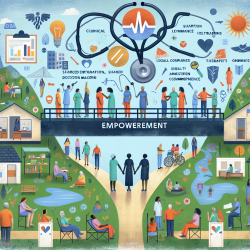Introduction
As practitioners in the field of speech-language pathology and social work, we are constantly faced with the challenge of adapting to new circumstances and supporting our clients through difficult times. The COVID-19 pandemic has presented a unique opportunity to reflect on shared trauma and resilience. A recent research article, "Student Reflections on Shared Trauma: One Year Later," provides valuable insights into the experiences of graduate social work students at NYU during the pandemic. By examining their reflections, we can enhance our practice and support students in navigating similar challenges.
Understanding Shared Trauma
The concept of shared trauma refers to the simultaneous experience of trauma by both practitioners and clients. During the COVID-19 pandemic, social work students faced the dual challenge of learning about trauma treatment while living through a global trauma themselves. Their reflections reveal the complexities of managing home life, school experiences, field placements, mental health challenges, and racial disparities.
Key Insights from Student Reflections
- Home Life: Students reported significant changes in their home environments, with some returning to live with family and others facing unsafe situations. The loss of independence and social connections was a common theme, highlighting the importance of addressing these challenges in therapeutic settings.
- Graduate School Experience: The transition to online learning and field placements posed challenges for students. They expressed feelings of disconnection and questioned the value of their education. This underscores the need for supportive and interactive learning environments.
- Mental Health and Coping: Students experienced heightened anxiety, depression, and burnout. They utilized various coping mechanisms, such as mindfulness, journaling, and seeking professional help. These strategies can be integrated into therapy sessions to support clients in managing their mental health.
- Racial Trauma: The pandemic exacerbated racial disparities and injustices, impacting students' mental health and sense of safety. Practitioners must be aware of these dynamics and create safe spaces for clients to discuss and process their experiences.
Implementing Research Outcomes
Practitioners can improve their skills by incorporating the insights from this research into their practice. Here are some actionable steps:
- Foster Resilience: Encourage clients to identify and build on their strengths. Highlight the resilience demonstrated during challenging times and explore ways to apply it to future situations.
- Enhance Communication: Create open lines of communication with clients, allowing them to express their feelings and concerns. Validate their experiences and provide support in navigating shared trauma.
- Promote Self-Care: Emphasize the importance of self-care and offer strategies for managing stress and burnout. Encourage clients to engage in activities that promote well-being and balance.
- Address Racial Trauma: Acknowledge and address the impact of racial trauma on clients. Create culturally sensitive interventions and advocate for systemic change to reduce disparities.
Encouraging Further Research
The reflections shared by the students provide a foundation for further research on shared trauma and resilience. Practitioners are encouraged to explore additional studies and contribute to the growing body of knowledge in this area. By staying informed and engaged, we can continue to improve outcomes for our clients and support the next generation of social workers.
To read the original research paper, please follow this link: Student Reflections on Shared Trauma: One Year Later.










